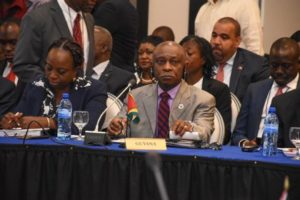Foreign Affairs Minister, Carl Greenidge said there are several issues of interest to Guyana, during the 29th Inter-sessional Heads of Government Meeting, which it will pursue.
This annual meeting of the Caribbean Community’s (CARICOM) leaders is being held in Port-au-Prince, Haiti from February 26-27. Minister Greenridge spoke to the Department of Public Information (DPI) following the opening ceremony at the Marriott Hotel today.

The minister, who is leading Guyana’s delegation, noted that the impact of ‘blacklisting’, an agenda item, is of special interest to this country. Last December the European Union (EU) included four member states on a list of countries it deemed, non-cooperative tax jurisdictions.
This issue was raised by both Grenada (which was blacklisted) and CARICOM’s Secretary-General, Ambassador Irwin LaRocque during the opening of the inter-sessional meeting.
“These are issues which place an unfair burden on small countries which don’t have a voice, or at least whose voice is in the main forum, and are not taken into account,” Minister Greenidge said, adding that “of course, it’s a long list of items…I would single those out for consideration by the meeting as having special interest to Guyana”.
The future of the region in the context of Cotonou, ensuring the region’s aviation industry can meet the needs of the region, the movement of skills within CARICOM is also of special interest to Guyana.
The minister further noted that border issues will be discussed during the caucus of the heads of government and advisors. Guyana and Belize are member states whose territorial integrity remain under claims from their neighbours.
“In that caucus, they will be receiving reports on what has happened in relation to this problem since Guyana’s was last examined and what is happening in the case of Belize and Guatemala as regards plans to send their case also to the ICJ”, Minister Greenidge noted.
CARICOM has been in support of Guyana’s call for the resolution of the Guyana/Venezuela territorial controversy via the International Court of Justice (ICJ). The United Nation’s Secretary-General has made a decision for the World Court to adjudicate on the issue.



